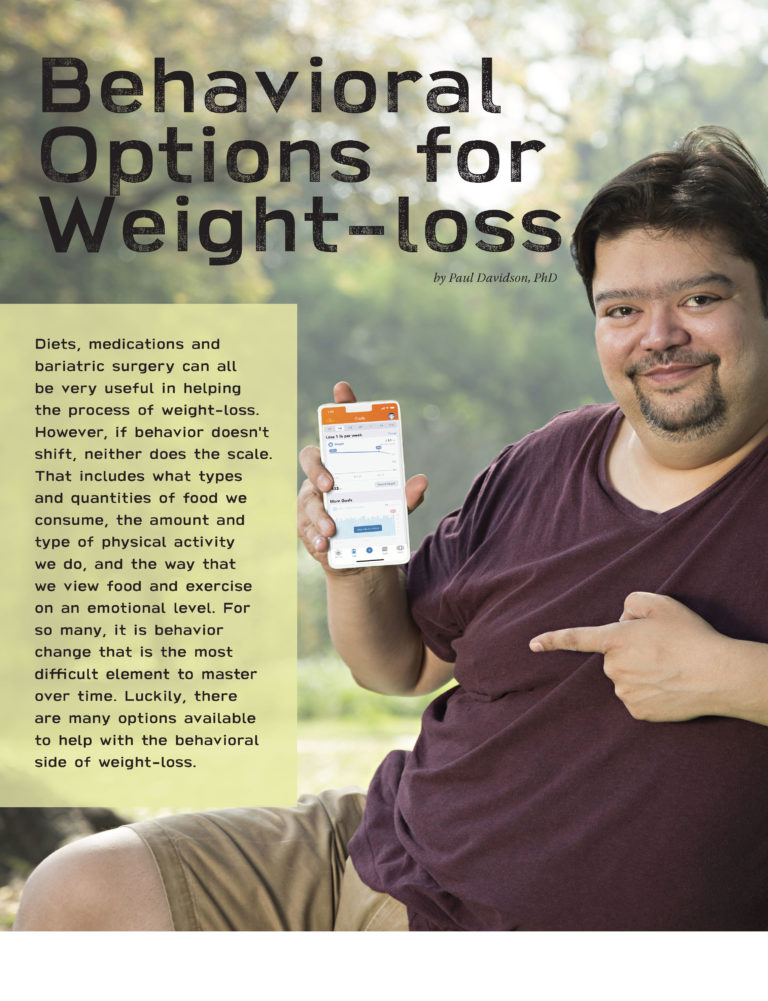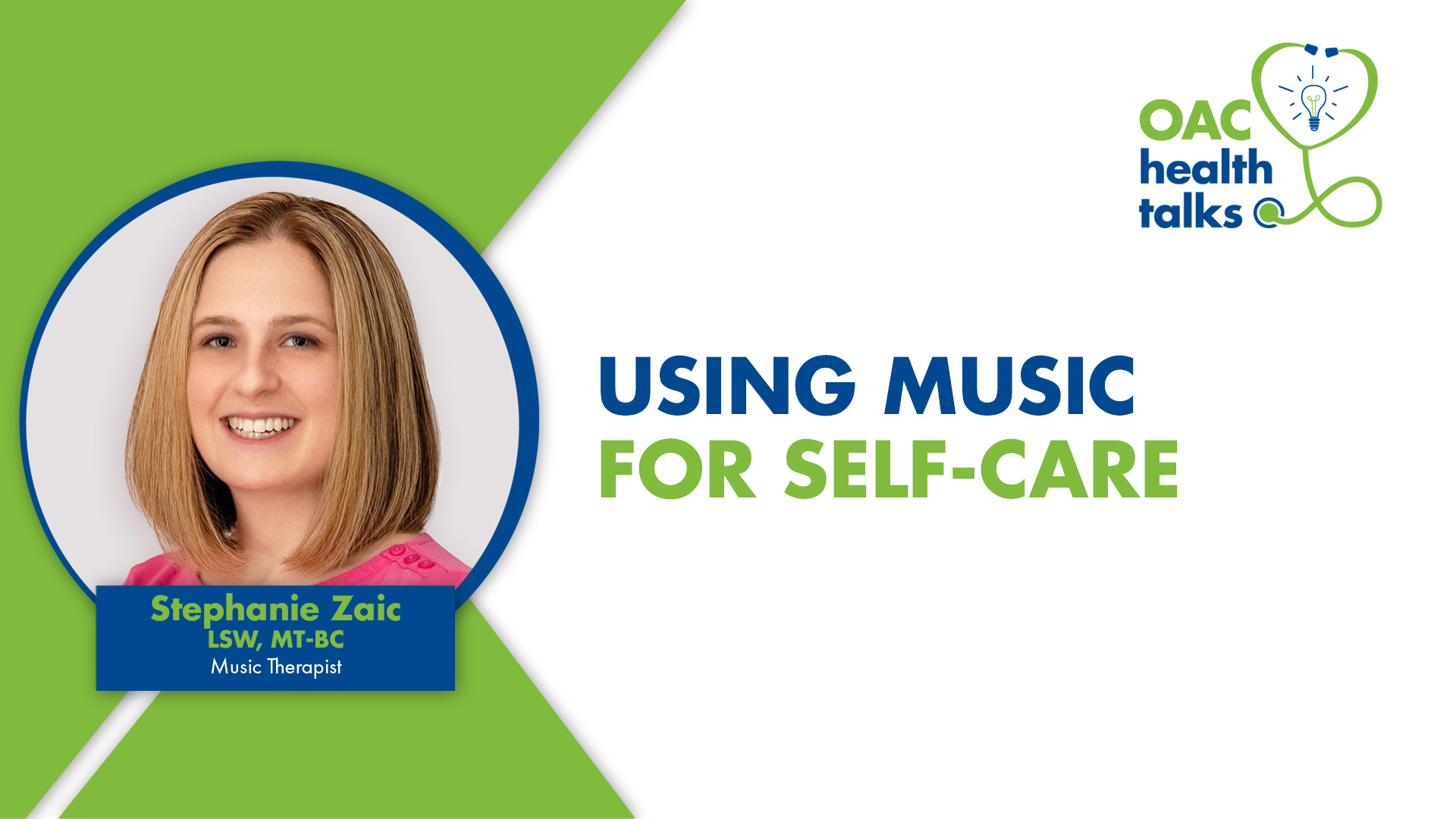Behavioral Options for Weight-loss


by Paul Davidson, PhD
Spring 2021
Diets, medications and bariatric surgery can all be very useful in helping the process of weight-loss. However, if behavior doesn’t shift, neither does the scale. That includes what types and quantities of food we consume, the amount and type of physical activity we do, and the way that we view food and exercise on an emotional level. For so many, it is behavior change that is the most difficult element to master over time. Luckily, there are many options available to help with the behavioral side of weight-loss.
Self-Monitoring Your Food Intake
The most successful long-term behavioral strategy for weight-loss is self-monitoring – tracking information relevant to the goal and using that data to help make decisions. In its simplest form, one can jot down information in a notebook, but we now have sophisticated tools to make it easier to accurately record whatever needs to be monitored.
Simplifying the task of food-logging has been made possible using mobile phone apps such as:
- MyFitness Pal
- Baritrastic
- Lose It! Calorie Counter
- MyPlate
Features such as nutritional information, being able to save your favorite meals, calorie trackers and the ability to follow your results over time increase the rewarding nature of tracking your intake. Many of these apps also offer meal plan suggestions, recipes, and the flexibility to help develop weekly shopping lists.
Tracking Your Physical Activity
Tracking physical activity is another key form of self-monitoring. The world of tools to help with this has exploded over the past decade. Most everyone now knows about the Fitbit and Apple Smart Watch, both of which do a great job of measuring steps taken, distance traveled, steps climbed, heart rate and sleep patterns. They also remind you to move on a regular basis. Waterproof models can help keep track of physical activity in a pool or other body of water. Other companies such as Garmin, Samsung, Jawbone, Nike, and Withings are comparable and offer similar features.
Like advanced pedometers, smartphones have built-in accelerometers to measure movement with either included or downloaded apps such as:
- Health
- Pacer
- Activity Tracker
- Google Fit
- Map My Walk
The ability to monitor this information is a huge behavioral help in setting and achieving goals.
Weight-loss Programs
Today’s weight-loss programs are based on both nutritional concepts and behavioral precepts. Social support (delivered primarily online), positive reinforcement, practical goal-setting, and the use of self-monitoring form the basis of many offerings. While there used to be a scarce amount of weight-loss programs that focused on behavioral options, there are now quite a few that are proven to be effective:
Weight Watchers (WW)
The oldest and most thoroughly researched and tested program is Weight Watchers, now rebranded as WW, which creates individualized plans based on personal assessments. This updated classic provides its members with:
- Healthier nutrition choices
- Meal suggestions
- Foods that can be purchased
- Activity tracking
- Fitness classes
- Mindfulness education
- Sleep strategies
- Coaching and community options
- Rewards for reaching goals
NOOM
A newer competitor in the space is NOOM, an app-based program which utilizes food logging and recipes with the input of nutritionists, as well as physical activity offerings developed by personal trainers after an initial evaluation.
Support group options are embedded into each of these offerings so that behavioral reinforcement is gained from users as well as professionals. NOOM is wildly successful and is a fast-growing company.
YMCA’s Diabetes Prevention Program
Though less well-known due to lack of commercialization, another powerful behaviorally-based weight-loss program is offered through the National Diabetes Prevention Program.
Based on medical, behavioral and nutritional research, these programs have been offered primarily at YMCAs to help people lose weight and reduce the risks of diabetes. An emphasis on lifestyle change with increased activity levels and reduced caloric intake has demonstrated both weight-loss and the reduction in diabetes for over a decade.
Health Coaching
Health coaching is a great behavioral strategy for improving weight-loss. Many companies, including InHealth, Vida Health, and Livongo offer personalized coaches who meet with clients on a regular basis and set ongoing goals that fit that person’s needs and wants.
Coaching commonly includes a focus on appreciating a “stages of change model” which includes:
- Recognizing how committed someone is to act on their goals
- Setting achievable targets for behavioral shifts
- Following the client’s lead
- Providing training on how to complete certain skills
- Consistent reinforcement of progress
Peloton
The COVID-19 pandemic has skyrocketed the usage of at-home exercising with one of the most popular options being the Peloton bike.
The purchase of one of their spin bikes or a competing model, with the purchase of their app, opens a world of classes for all levels of fitness. For those with the name brand bike or treadmill, the instructors can control the speed, resistance or elevation of the machine to go along with the class.
People are called out and encouraged by name, which enhances connection and motivation. The ability to take classes with friends means individuals can share their training and rankings, allowing for competition which is motivating for many.
The Mirror
The Mirror offers personalized fitness training with a model of how to complete exercises, allowing individuals to copy the movements of the coaches and to benefit from encouragement. The activities offered by the Mirror range from weight lifting to yoga, cardio and dance, providing something for almost anyone. A significant issue with all of these machines, however, is the high price tag to get the equipment and then the recurring monthly payments for the classes.
Behavior is the Key!
While diet and exercise will always be important factors for weight loss, changing your behavior or developing new behaviors can help with sustainability in your weight-loss journey. Use tools and resources that make you feel motivated and keep you on track with your goals. In doing this, you can have successful weight-loss and tap into a more determined and motivated side of yourself.
About the Author:
Paul Davidson, PhD, is the Director of Behavioral Services for the Center for Metabolic and Bariatric Surgery at Brigham and Women’s Hospital in Boston and is an instructor at Harvard Medical School. He is an elected member of the Integrated Health Executive Council for the American Society of Metabolic and Bariatric Surgery who speaks and writes regularly about bariatric topics. He helps lead monthly #obsm chats on Twitter and is a proud member of the Obesity Action Coalition (OAC,) as well as a returning speaker at the OAC’s Annual Your Weight Matters Convention.
by Nina Crowley, PhD, RD (with Inspiration from Shawn Cochran) Winter 2024 Dating, no matter your age,…
Read ArticleDid you know that stress can have an impact on weight? Many people increase their food intake…
View VideoEating disorders can be a concern or question for many who are along the journey to improved…
View Video









